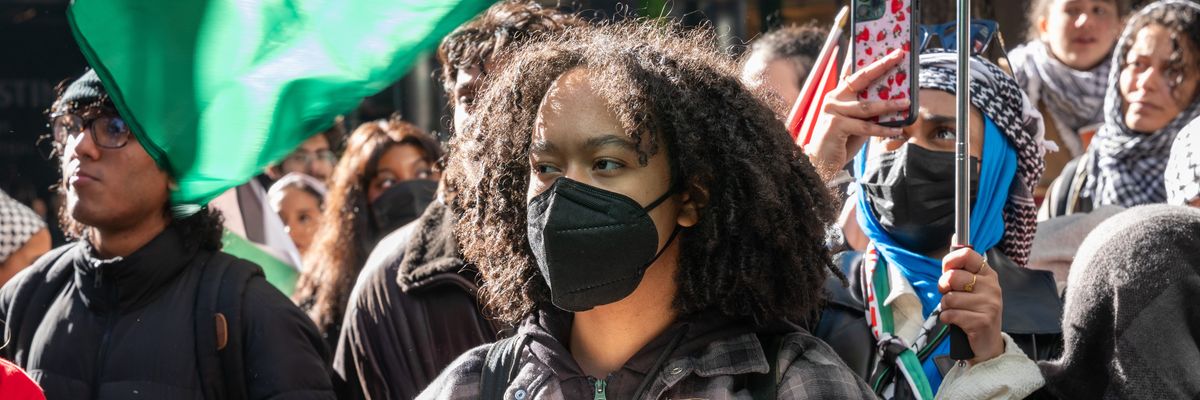More than 1,700 lawyers and law students on Tuesday urged the American Bar Association to take action to combat the growing trend of censorship and discrimination against those voicing solidarity with Palestinians amid Israel's devastating bombing campaign, ground invasion, and siege in Gaza.
Since Israel launched its latest military assault on the Gaza Strip following a deadly Hamas-led attack on October 7, there have been "increasing instances of discrimination and censorship faced by Palestinian, Muslim, Arab, South Asian, Black, Indigenous, immigrant, and other communities within law schools, universities, law firms, and other corporate entities, particularly due to their expression of support for the Palestinian people," the lawyers and students wrote in a
newly released letter to the ABA.
"These incidents include rescinding job offers, terminating employees, and harassing and doxxing law students, among others," the
letter states. "We share our grave concerns that the target of these incidents are law students and legal professionals seeking to uphold international law and Palestinian human rights. Censorship and retaliation cause democratic backsliding, against which our profession is one of the guardrails, and is antithetical to the very foundations of a free society."
The letter, which was also backed by a collective of more than 125 legal institutions, comes after Columbia University
suspended two pro-Palestinian groups and the prominent New York-based law firm Davis Polk rescinded job offers for three Harvard and Columbia law students over their purported roles on campus organizations that signed a pair of statements in the wake of the October 7 attack.
One of the
statements extended "heartfelt condolences to the individuals and communities at Columbia University affected by the tragic losses experienced by both Palestinians and Israelis" and argued that "the weight of responsibility for the war and casualties undeniably lies with the Israeli extremist government and other Western governments, including the U.S. government, which fund and staunchly support Israeli aggression, apartheid, and settler-colonization."
The
other statement, released by the Harvard Palestine Solidarity Committee, argued that the events of October 7 "did not occur in a vacuum" and stated, "The apartheid regime is the only one to blame."
Davis Polk is
reconsidering its decision for two of the students after they objected to the rescissions, saying they did not authorize the statements—neither of which named individual signatories.
After former Harvard president Larry Summers condemned the Harvard Palestine Solidarity Committee's statement on social media, Republican members of Congress and
business leaders quickly seized on it and demanded retaliation against the signatories.
"I have been asked by a number of CEOs if Harvard would release a list of the members of each of the Harvard organizations that have issued the letter assigning sole responsibility for Hamas' heinous acts to Israel, so as to insure [sic] that none of us inadvertently hire any of their members," hedge fund billionaire Bill Ackman wrote. "If, in fact, their members support the letter they have released, the names of the signatories should be made public so their views are publicly known."
Within days of the Harvard statement's release, Harvard senior Rebecca Cadenhead
reported for The Nation, "opponents of the letter began to post the personal information of students in the Palestine Solidarity Committee and other signatories."
"Currently, at least four websites list such personal information, and students have reported that hundreds of strangers have tried to contact their employers and families, targeted their social media accounts, and sent them intimidating messages, including death threats," Cadenhead added. "As a result, a list of the co-signing organizations was removed from the letter on the afternoon of October 10."
In their new letter, the coalition of lawyers and law students wrote that "academic and employment retaliations against individuals based on their beliefs, ethnic backgrounds, nuanced academic opinions, or religious affiliations not only infringe upon their rights to academic freedom but also silence important voices from our communities, which are necessary for a well-functioning pluralistic democratic society."
The letter calls on the ABA to take a number of steps to "aid in the reversal of the pervading atmosphere of fear and unlawful targeting of law students and lawyers," including urging law schools to "take proactive steps to protect their students" from doxxing campaigns and issuing "public guidance signaling its intolerance against any and all forms discriminatory retaliation."
"The suppression of dissenting voices, at this moment, especially those advocating for peace and non-violence, is antithetical to the very foundations upon which our democracy stands and our legal profession is built," the letter reads. "We remain hopeful that with the ABA's guidance, we can continue to create a more inclusive and just profession."




